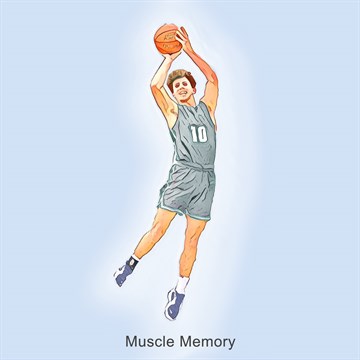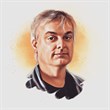Conscious Connection with Material Life
Examining conscious connections to matter
 From a dogmatic materialist perspective, the focus of consciousness is solely a spontaneous emergent phenomenon from the brain. There are no good explanations for how or why the brain generates consciousness - it just magically appears at some arbitrary point in the evolution of the brain. There are no explanations of how humans have qualia or subjective experiences. There are no explanations for how consciousness can travel through space and time and conjure up conscious visuals of past and future and imagine alternate choice pathways. This is sometimes referred to as the "hard problem of consciousness", a phrase coined by philosopher, David Chalmers.
From a dogmatic materialist perspective, the focus of consciousness is solely a spontaneous emergent phenomenon from the brain. There are no good explanations for how or why the brain generates consciousness - it just magically appears at some arbitrary point in the evolution of the brain. There are no explanations of how humans have qualia or subjective experiences. There are no explanations for how consciousness can travel through space and time and conjure up conscious visuals of past and future and imagine alternate choice pathways. This is sometimes referred to as the "hard problem of consciousness", a phrase coined by philosopher, David Chalmers.
The ConscioCentric Paradigm posits that consciousness is fundamental to, and directly connected to matter itself. Consciousness is interweaved into the very fabric of spacetime, and the the evolution of the universe, and advanced forms of life are a result of consciousness.
From a physiological standpoint, the brain is certainly a masterpiece of consciousness, but it is not a magic knot of gray matter that creates consciousness. The brain is a highly advanced electrical and chemical processing engine, with billions of neurons, that coordinates activity, triggers molecule factories within the body, and helps to keep a balance of energy and matter throughout our human bodies. The brain is an advanced transceiver, both receiving information from our conscious minds eye, and transmitting information back to our consciousness about the state of our material bodies. Indeed the amount of information processing and conscious communication is greatest in our brain regions, as they contain the greatest density of information from our 3D bodies and material environment around us. Though the brain is the pinnacle of our conscious evolution over billions of years of evolution on this planet, brains are not required for consciousness.
Within our human bodies, our consciousness communicates directly with various organs. When we learn a new skill like walking, running, throwing a basketball, or playing guitar, we initially use both our local conscious control over our legs, arms and hands, plus our higher level consciousness is focused on the macro choreography of the task. But as we learn the skills, and later come to master them, our higher level conscious focus is no longer required to perform the skills, and our conscious control over walking, running, shooting basketballs, or playing guitar is instead done directly. Interestingly, we already call this amazing feat by an appropriate name: Muscle Memory.
 Muscle memory can really be literally interpreted as our muscles and lower organs directly participating in the conscious realm. They have memory, and extremely acute control to perform precise adjustments in real time, coordinating with direct sense of touch, gravity, and other data from our consciousness like a visual 3D model generated by our minds eye from vision and other senses. Direct conscious control allows the degree of precision and timing required in order to adjust the millions of neurons in the hands, arms and body to release a basketball, rolling off the tips of fingers, while the whole body is in motion, and have that ball travel in an arc twenty two feet in the air and swish a hoop net.
Muscle memory can really be literally interpreted as our muscles and lower organs directly participating in the conscious realm. They have memory, and extremely acute control to perform precise adjustments in real time, coordinating with direct sense of touch, gravity, and other data from our consciousness like a visual 3D model generated by our minds eye from vision and other senses. Direct conscious control allows the degree of precision and timing required in order to adjust the millions of neurons in the hands, arms and body to release a basketball, rolling off the tips of fingers, while the whole body is in motion, and have that ball travel in an arc twenty two feet in the air and swish a hoop net.
Once we develop muscle memory for shooting a basketball, or playing guitar, or other skills, it requires almost no macro level focus by the brain. The brain still helps coordinate the organs and can focus on higher level concepts like breaking down a defensive scheme, or focusing on near future chord progressions or key signature changes, but our muscle memory, and that local, direct participation with our consciousness takes care of the complex motions of shooting, or fingering perfect riffs and chords with vibrato and feel in millisecond timing accuracy.
Further, even just focusing on neurons being the generator of consciousness is too materialist. Studies have shown that plants, devoid of neurons, possess various capabilities to sense and respond to their environment, adjusting their morphology. Studies have also shown that plants have memory as well, and a sense of time.
All signs from quantum mechanics to cutting edge chemistry, biology and neuroscience seem to indicate that conscious may well be directly enfolded into the fabric of spacetime, and all matter, and our highly evolved bodies, and multi organ systems are just the result of billions of iterations of evolution, and consciousness refining material bodies to allow greater environmental control and speed of movement within our planets ecosphere.
https://en.wikipedia.org/wiki/Plant_perception_(physiology)
https://en.wikipedia.org/wiki/Hard_problem_of_consciousness
https://www.medicalnewstoday.com/articles/320289#carry_message
https://www.psychiatry.wisc.edu/courses/Nitschke/seminar/Lent_EurJNS2011_HowManyNeurons_DogmasofQuantNS-Revised.pdf
 David ChalmersPhilosopher and Cognitive Scientist
David ChalmersPhilosopher and Cognitive Scientist "Another useful way to avoid confusion [used by e.g. Allen Newell 1990 Unified Theories of Cognition] is to reserve the term "consciousness" for the phenomena of experience, using the less loaded term "awareness" for the more straightforward phenomena... If such a convention were widely adopted, communication would be much easier; as things stand, those who talk about "consciousness" are frequently talking past each other."
 David ChalmersPhilosopher and Cognitive Scientist
David ChalmersPhilosopher and Cognitive Scientist "The easy problems of consciousness are those that seem directly susceptible to the standard methods of cognitive science, whereby a phenomenon is explained in terms of computational or neural mechanisms. The hard problems are those that seem to resist those methods. ...The really hard problem of consciousness is the problem of experience. When we think and perceive, there is a whir of information-processing, but there is also a subjective aspect. ...When we see, for example, we experience visual sensations: the felt quality of redness, the experience of dark and light, the quality of depth in a visual field. Other experiences go along with perception in different modalities: the sound of a clarinet, the smell of mothballs. Then there are bodily sensations, from pains to orgasms; mental images that are conjured up internally; the felt quality of emotion, and the experience of a stream of conscious thought."
 David ChalmersPhilosopher and Cognitive Scientist
David ChalmersPhilosopher and Cognitive Scientist "We won't have a theory of everything without a theory of consciousness."